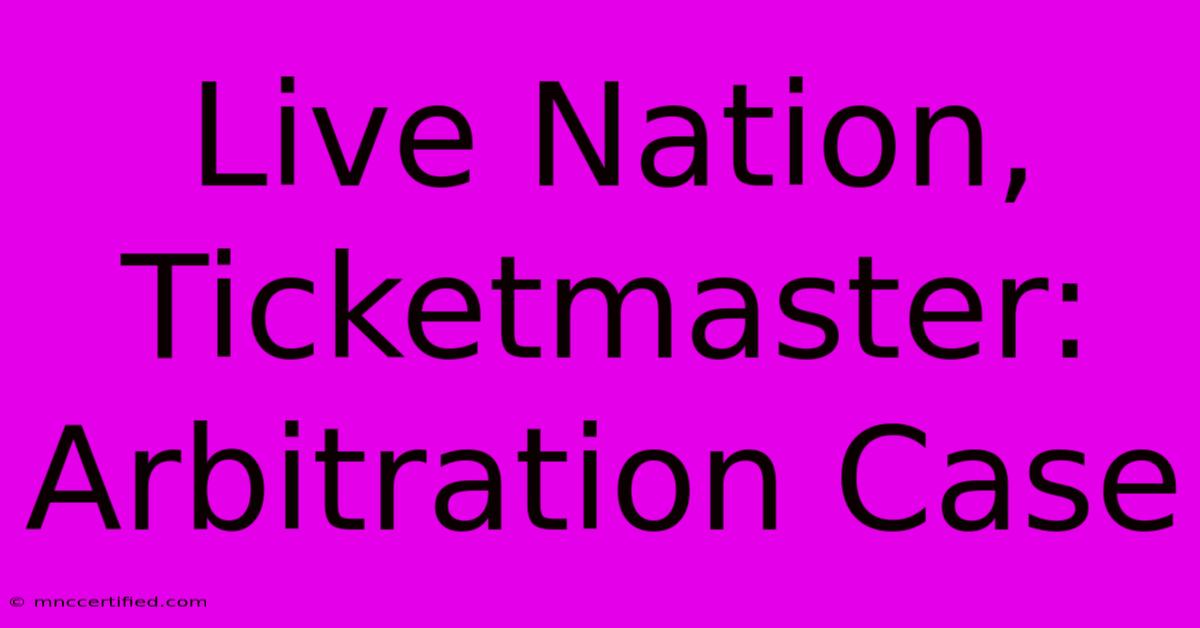Live Nation, Ticketmaster: Arbitration Case

Table of Contents
Live Nation & Ticketmaster: A Deep Dive into the Ongoing Antitrust Arbitration
The behemoth that is Live Nation Entertainment, parent company of Ticketmaster, has consistently faced scrutiny regarding its monopolistic practices. A recent, significant development is the ongoing antitrust arbitration case against the company, highlighting concerns about market dominance and its impact on artists and consumers alike. This article delves into the key aspects of this complex legal battle, exploring the accusations, the arguments, and the potential ramifications for the future of the live entertainment industry.
The Core Accusations: Stifling Competition and Exploiting Consumers
At the heart of the arbitration lies the accusation that Live Nation/Ticketmaster leverages its immense power to stifle competition and exploit both artists and consumers. The claims center around several key areas:
1. Anti-competitive practices:
- Market Dominance: Critics argue that Live Nation's near-monopoly in ticketing and venue management creates an unfair advantage, limiting choices for artists and driving up prices for fans. The sheer scale of their operations – controlling a significant portion of major venues and ticketing sales – allegedly allows them to dictate terms and stifle potential competitors.
- Exclusive Contracts: Accusations include the use of exclusive contracts with venues and artists, preventing them from using competing ticketing platforms. This effectively locks out smaller players and limits consumer choice.
- Bundling Practices: The practice of bundling ticketing services with venue management is another point of contention. This allegedly makes it difficult for artists and venues to use alternative ticketing providers, reinforcing Live Nation’s dominance.
2. Exploitative Pricing and Fees:
- Dynamic Pricing: Ticketmaster's use of dynamic pricing, where ticket prices fluctuate based on demand, is a major point of criticism. While defended as a market-driven approach, critics argue it leads to exorbitant prices, especially for popular events.
- Hidden Fees: Consumers frequently complain about the numerous hidden fees added to the base ticket price, significantly increasing the final cost. These fees, often described as "service charges" or "facility fees," are a source of widespread frustration.
- Lack of Transparency: The lack of transparency in pricing and fee structures contributes to consumer dissatisfaction and fuels claims of exploitative practices.
The Arguments of the Defense: A Case for Market Efficiency
Live Nation/Ticketmaster's defense typically centers on arguments of market efficiency and innovation. They contend that:
- Their scale provides benefits: They argue that their size allows them to offer better services and technology to both artists and fans, including advanced ticketing systems and improved venue management.
- Dynamic pricing reflects market demand: They defend dynamic pricing as a reflection of market forces, arguing that it allows for efficient allocation of tickets and prevents scalping.
- Competition still exists: They point to the existence of smaller ticketing platforms and venue management companies as evidence that competition remains in the market, albeit on a smaller scale.
The Implications of the Arbitration: Shaping the Future of Live Entertainment
The outcome of this arbitration holds significant implications for the future of the live entertainment industry. A ruling against Live Nation/Ticketmaster could lead to:
- Structural changes: Potential remedies could involve divestitures, forcing Live Nation to sell off parts of its business to increase competition.
- Regulatory reform: The case could spur regulatory action, leading to new laws and regulations aimed at preventing anti-competitive practices in the ticketing and venue management sectors.
- Changes in pricing and fees: A favorable ruling for plaintiffs could lead to greater transparency in pricing and a reduction in hidden fees.
Beyond the Legal Battle: The Broader Conversation on Fair Access and Consumer Rights
The Live Nation/Ticketmaster arbitration is more than just a legal dispute; it reflects a broader conversation about fair access to live entertainment and consumer rights. The high cost of tickets, coupled with concerns about monopolistic practices, has fueled public outrage and calls for increased regulation and transparency within the industry. The ultimate outcome will have significant repercussions for both industry players and music fans worldwide. This is a case to watch closely, as it will likely influence the future of how we experience live music and events for years to come.

Thank you for visiting our website wich cover about Live Nation, Ticketmaster: Arbitration Case. We hope the information provided has been useful to you. Feel free to contact us if you have any questions or need further assistance. See you next time and dont miss to bookmark.
Featured Posts
-
Ca Lottery Results Nov 26 2024 Mega Millions Daily 3
Nov 27, 2024
-
Uk Diplomat Expelled Russias Spy Accusation
Nov 27, 2024
-
Barcelona Vs Brest Lineups Team News
Nov 27, 2024
-
Motorcycle Insurance Las Vegas
Nov 27, 2024
-
87 Year Old Freemans Dinner Date
Nov 27, 2024